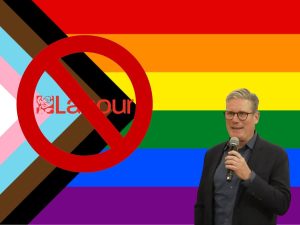Jeremy Corbyn’s Peace and Justice Project is hosting a Pits and Perverts 40th anniversary concert on 16 December. It’s part of their Music For The Many campaign – but will also be raising funds for people devasted by Israel’s genocide in Gaza, as well as refugees over here. But what was the original concert, and what impact did it have?
Pits and Perverts against the Miners’ Strike backdrop
This iconic event was organised by Lesbians and Gays Support the Miners (LGSM), a group formed in response to the Tory-induced hardships faced by striking miners during the UK Miners’ Strike of 1984-85. The concert, held in London on 10 December 1984, became a historic moment in the struggle for social justice and mutual support.
The backdrop of this event was the UK Miners’ Strike, a defining confrontation between the National Union of Mineworkers (NUM) and the Conservative government led by prime minister Margaret Thatcher.
The strike, which began in March 1984, was a response to the government’s plans to close down many of the country’s coal mines, threatening the livelihoods of tens of thousands of miners and their communities. As the strike dragged on, miners and their families faced increasing financial hardship, with the government and media portraying them as the enemy.
It was in this context that LGSM emerged.
LGSM: an iconic group, which created an iconic moment
Founded by Mark Ashton, Jackson, and other activists, LGSM was motivated by the belief that the struggle of the miners was fundamentally linked to their own fight against oppression. They recognised that both communities were being targeted by a government determined to crush dissent.
The LGBTQ+ community, facing rampant homophobia and discriminatory laws, saw an opportunity to forge an alliance with the miners, who were enduring their own form of marginalisation.
The name Pits and Perverts was derived from a derogatory headline used by a British tabloid newspaper. The term “pits” referred to the coal mines, while “perverts” was a slur aimed at the LGBTQ+ community.
Rather than shying away from this insult, LGSM embraced it, using it as the title for their fundraising concert, effectively reclaiming the language used against them. This act of defiance was a powerful statement, turning bigotry on its head and demonstrating the resilience and unity of both communities.
The concert was held at the Electric Ballroom in Camden, London, and featured performances from prominent bands of the time, including Bronski Beat, a group known for their openly gay frontman Jimmy Somerville.
The event drew a crowd of around 1,500 people and raised over £5,000 (equivalent to about £16,000 today) for the miners and their families. Beyond the financial support, the concert forged a deep bond between the LGBTQ+ community and the miners, one that would have lasting effects.
Tangible effects away from the concert
The solidarity shown by LGSM was not merely symbolic. It had real, tangible effects on the strike. The funds raised helped sustain the miners’ families during a period of immense hardship. Additionally, the miners, many of whom had never previously encountered openly gay individuals, were moved by the support they received. This alliance helped break down prejudices and foster mutual understanding.
As Jackson told the Camden New Journal:
The protocol was it was free entry for miners. I remember walking through the crowd and this young Scottish miner saw I was wearing a Pits and Perverts T-shirt. He asked if I had something to do with the gig. I grinned. He was gobsmacked. He said – I had no idea you supported us… I put my arm round him and we looked out over the crowd, and said ‘well, now you do’.
The Pits and Perverts concert of 1984 is often used as a symbol of solidarity, uniting two seemingly disparate communities: the LGBTQ+ community and the South Wales mining community. Of course, they weren’t really that disparate – as there were plenty of working-class LGBTQ+ people in mining communities. As Jackson said:
We knew of LGBT people in the mining communities, it wasn’t a case of ‘us and them’. I come from Lancashire. A lot of us were from mining areas. They had working-class backgrounds and had family or friends in the mining community.
Now, Corbyn and the Peace and Justice Project will be reinvigorating that sense of cross-campaign solidarity.
Pits and Perverts for the 21st century
40 years on from the original iconic organised by LGSM in solidarity with the South Wales mining community, Corbyn’s Peace and Justice Project concert will highlight the importance and invaluable contribution of grassroots music venues and creative spaces in community organising and building unity.
Corbyn will be joined by the Oozes and many more special guests who we will be announcing very soon. You can buy tickets here.
The legacy of the Pits and Perverts concert and the LGSM’s broader efforts was profound. It contributed to the eventual shift in attitudes within the labor movement towards LGBTQ+ rights. When the Miners’ Strike ended in 1985, the NUM expressed their gratitude by marching alongside LGBTQ+ activists in that year’s Pride parade in London.
In the years since, the story of LGSM and the Pits and Perverts concert has been celebrated as a powerful example of cross-community solidarity. It serves as a reminder that the fight for justice often requires us to build bridges between diverse groups, recognising that their struggles are interconnected.
The event is a testament to the power of unity, demonstrating that when marginalised communities come together they can challenge the established order.
Featured image via the Canary




